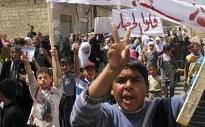 Anonymous sources report that Turkey is considering a number of options to help Syrian President Bashar al Assad defuse the uprising in his country.
Anonymous sources report that Turkey is considering a number of options to help Syrian President Bashar al Assad defuse the uprising in his country.
According to Ivan Watson, CNN's Istanbul based correspondent, multitudes of Syrians are entering Turkey. 10,757 Syrian refugees in total. 12 have been recorded having bullet wounds. 441 recorded having returned to Syria in past 24 hours, and 76 new arrivals today, Ivan reported.
On June 23, the Turkish Foreign Minister Ahmet Davutoglu, reportedly spoke with his Syrian counterpart, Walid al-Moallem, about the security situation in Syria. Both apparently discussed the movement of Syrian troops and refugees on their shared border, a situation that has created tension for both.
Despite the public condemnation of Syrian President Bashar al Assad for his regime’s use of violence against the opposition, Turkey has privately endorsed a strategy towards Syria that endorses Syrian internal political and social reforms.
Turkey has provided Syrian opposition forces, including the Syrian Muslim Brotherhood (MB), open forums to organize.
According to STRATFOR sources, one of the options Turkey is considering is a political model akin to the Lebanese political system. Lebanon operates on a confessional system and on a 1932 census that roughly divides power between the country’s Christian and Muslim sects. The proposal for Syria would entail equally dividing power between the country’s Arab and Kurdish Sunni majority and the country’s minorities — Alawites, Druze and Christians. The system would create checks and balances to prevent either side from monopolizing the political system or imposing its will on the other.
 The Norwegian newspaper Aftenposten has published a set of cables that shed light on Omar Suleiman’s willingness to serve the interests of Israel. The man recently appointed as vice-president of Egypt, according to a cable from 2005, was willing to help former head of security in the Israeli Defense Ministry Amos Gilad by guaranteeing there would be no democratic elections in Gaza in 2006. He was also willing to help Israel better manage the Rafah crossing between Gaza and Egypt.
The Norwegian newspaper Aftenposten has published a set of cables that shed light on Omar Suleiman’s willingness to serve the interests of Israel. The man recently appointed as vice-president of Egypt, according to a cable from 2005, was willing to help former head of security in the Israeli Defense Ministry Amos Gilad by guaranteeing there would be no democratic elections in Gaza in 2006. He was also willing to help Israel better manage the Rafah crossing between Gaza and Egypt.
Cables released also reveal that a key motive for opposing Hamas was a fear that the Muslim Brotherhood would be emboldened. 05TELAVIV5864 details a meeting that Gilad wanted kept secret. Gilad talked about his fear of the Palestinian uprising movement Hamas, which was expected to get a large amount of the vote in the democratic elections in January 2006. Gilad was afraid that Hamas would win the election and that a Hamas win would "destroy everything."
Theme by Danetsoft and Danang Probo Sayekti inspired by Maksimer